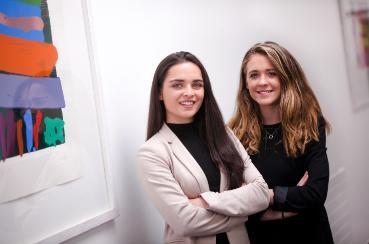| Code | CK213 |
|---|---|
| Duration | 4 years |
| Teaching Mode | Full-time |
| Qualifications | BSc (Hons) |
| NFQ Level | Level 8 |
| CAO Points | 2025: 466 |
| CAO Points Range | 2025: 466-555 |
Course Outline
BSc (Hons) Food Marketing & Entrepreneurship offers a unique combination of business and food science, providing graduates with the skills to work in various roles across the food and non-food sectors. During Years 1-3 you will study modules across a range of disciplines including Food Business, Marketing, Food Policy, Management, Economics, Microbiology, Accounting, Law, and Nutrition.
This will provide you with a well-rounded education which will prepare you for a career in the dynamic food industry and other sectors, by nurturing innovation and entrepreneurship skills, by building knowledge of the food and nutrition sciences, by developing skills to assess business viability, and by promoting an understanding of consumer market trends and marketing strategies. All business and food science subjects will be taught at from an introductory level.
Modules
Year 1 Modules:
Students take 60 credits as follows:
- AC1116 Financial Accounting
- FE1000 Introduction to Food Business and Marketing
- EC1500 Ethics and Economic Decision Making in Food Business
- FE1030 Introduction to International Food Policy
- FE1200 Introduction to Sustainable Food Marketing Channels and Supply Chains
- FE1201 Preparing for Entrepreneurship and Placement in Food
- FS1011 Introduction to Food Science and Technology
- LW1108 Introduction to the Legal System
- LW1109 Introduction to Business Law
- MB1001 Introduction to Food and Industrial Microbiology
- MA1100 Introductory Mathematics for Business I
Year 2 Modules:
Students take 60 credits as follows:
Core Modules
- AC2200 Introduction to Management Accounting
- FE2014 Digital Food Marketing and Branding
- FE2204 Quantitative Research for Food
- FE2205 Food Business Sustainability
- FS2005 Principles of Food Science and Technology
- FE2206 Food Enterprise Management
- FS2007 Topics in Food Quality, Hygiene and Legislation
- IS1106 Introduction to Information Systems
- IS1107 Information Systems for the Networked Enterprise
- NT2013 Fundamentals of Nutrition Part 1
- ST1023 Introduction to Business Statistics
- ST2200 Methods of Business Statistics
Year 3 Modules:
Students take 60 credits as follows – all listed taught modules (45 credits) and a 15 credit Transferable Skills module (Placement or Research Module):
- FE3020 Understanding Supply Chain Management
- FE3201 Market-oriented New Food Product Innovation
- FE3208 Transferrable Skills - Food Business and Development - Work Placement
- or FE3209 Transferable Skills - Food Business and Development - Research Project
- FE3000 Food Market Insight and Problem Solving
- FS3011 Science and Technology of Food Systems B
- FS3018 Fundamentals of Food Packaging
- FS3022 Sensory Evaluation for Food and Nutritional Sciences
- MB3993 Food and Industrial Microbiology I
- MG3012 Enterprise and Innovation
- NT2014 Fundamentals of Nutrition Part 2
Year 4 Modules:
Students take 60 credits as follows: all listed core modules (50 credits) and 10 credits of elective modules:
Core Modules
- AC4406 Accounting in Business
- NT4021 Public Health Nutrition
- FE4002 Global Food Policy
- FE4205 Consumer Behaviour in Food Markets
- FE4207 Global Food Supply Chain Management and Circular Economy
- FE4208 Grocery Shopper Behaviour and Food Retail Marketing
- FE4475 Food Marketing and Entrepreneurship
- MG4035 Strategic Marketing
- MG4036 Strategic Management
Elective Modules
Students take modules to the value of 10 credits from the following:
- AC4407 Financial Reporting 1 (5)
- AC4408 Financial Reporting 2 (5)
- FE4008 Food Security and the Developing World (5)
- FE4009 Co-operatives, Food and Rural Sustainability (5)
- FS4906 Cereals and Related Beverages B (5)
- FS4011 Advanced Food Packaging (5)
- MG4043 International Marketing Management (5)
Academic Programme Catalogue
See the Academic Programme Catalogue for the complete and up-to-date content for this course. Note that the modules for all courses are subject to change from year-to-year. For complete descriptions of individual modules, see the Book of Modules.
Course Practicalities
Expected lecture hours: In a typical week most students will have 12 hours of lectures.
Expected reading hours: Self-directed learning is an important aspect of University education and the student will need to supplement in-class learning with the study of relevant reading materials. Study time is also used to work in teams to prepare project reports and essays. As a general rule of thumb for every hour in class, the student should complete three hours of self-directed learning.
Expected lab/practical hours: In a typical week most students will have 3-6 hours of seminars, tutorials and practical classes.
Why Choose This Course
Placement Testimonials
If you have an interest in both business and food, this course will be well suited.
During the course you will develop your creative, analytical, communication and professional skills. You will learn how to gather market intelligence, interpret data from multiple sources, identify market opportunities and communicate with target markets via social media. This will support you in developing a transferable skill set to prepare you to work in various roles within, and outside of, the food industry.
The course is designed to consider the challenges faced by businesses and expose students to the concepts, theories, and practical experiences that explain how the business world operates. Graduates will learn skills in strategic decision-making, innovation, enterprise and knowledge management, delivered through an integrated range of subjects that support successful personal and entrepreneurial business development. Practical applications in the form of group and individual projects, industry project collaboration, and placement and study abroad opportunities will be an integral part of your learning experience. The programme is built on UCC’s international reputation in food education and research and taught by lecturers who are internationally recognised in their fields of expertise.
Industry project experience
Throughout the duration of the course you will have various opportunities to engage directly with industry and work on projects that will provide you with real life experience and useful employability skills.
1st-4th years on the programme have the opportunity each year to get involved in working on extra-curricular projects for SuperValu’s Food Academy food producers. The Food Academy is a longstanding Musgrave initiative that helps develop and support emerging food & drink brands by giving producers their first step into the retail sector. Students who participate in this initiative gain invaluable experience working closely with Food Academy producers, providing expertise and creative input in the areas of social media, marketing, consumer and product market research and packaging redesign.
In second year, students will work on a consultancy project for an Irish company as part of one of their modules. This is an additional opportunity for students to develop real-life skills and experience which puts them at a significant advantage when applying for placement and graduate roles.
Year 3 will also offer the opportunity to avail of a 6-month industry placement to develop practical skills and experience. As an alternative to placement, you can complete a research project and have the opportunity to apply to participate in the Erasmus programme, spending 6 months in either France (Rennes), Germany (Konstanz), Italy (Bologna), or the Netherlands (Utrecht) to conduct your research project.
Placement or Study Abroad Information
An integral part of this programme is a six-month industrial placement during Year 3. The placement offers an excellent opportunity to draw on your knowledge and skills in
performing tasks in specific work contexts. This will enhance your work capabilities and offer you a chance to reflect on and better understand these.
Placement opportunities are both national and international, and past placements have included:
- Aldi (Buying Office)
- Nestle
- Cully & Sully
- Dairygold
- Dunnes Stores (Buying Office)
- Glenilen
- Glanbia (Supply Chain)
- Kepak Group
- Musgrave Group (Own Brand, Buying, Marketing)
- Rich Dairies (USA)
- Silver Pail
Alternatively, as part of the Erasmus programme, students can apply to spend the six-months studying abroad in either a German, Dutch, Italian or French university. As well as providing an engaging learning and social experience, studying abroad will provide insight into other markets and cultures, further boosting employability, particularly in organisations which rely heavily on export markets.
Skills and Careers Information
The transferable skills acquired will ensure that our graduates will be well positioned to find employment in the food and non-food sectors, locally or internationally.
Having successfully completed this course you should be able to:
- communicate and work effectively to a high professional standard;
- demonstrate advanced analytical and problem-solving skills associated with effective practice;
- apply ethical and sustainability principles to help address business issues;
- integrate knowledge of food and nutritional sciences into product development
The most recent Graduate Employability Survey (UCC 2020 Graduate Outcome Survey) points to 96% of graduates being in full-time employment or pursuing further study within six months of completing this degree.
Many of our graduates commence their careers on graduate programmes with companies such as Kerry, Musgrave, Aldi, Kepa and Bord Bia. Career prospects cover a wide range of functional areas including Brand Management; Social Media Marketing; Buying; Key Account Management; New Product Development; Category Management; Digital Strategy; and Supply Chain.
A variety of Masters programmes in related disciplines are available to graduates of the programme who wish to specialise in a particular area, and some graduates apply their entrepreneurship learning during the programme and go on to set up their own business.
Requirements
Leaving Certificate Entry Requirements
At least six subjects must be presented. Minimum grade H5 in two subjects and minimum grade O6/H7 in four other subjects. English and Irish are requirements for all programmes unless the applicant is exempt from Irish.
Applicants will need to meet the following minimum entry requirements:
| English | Irish | Other Language | Maths |
|---|---|---|---|
| O6/H7 | O6/H7 | O6/H7 | O6/H7 |
EU/EFTA/UK Qualifications
EU/EFTA/UK applicants presenting an equivalent school-leaving qualification should review the EU/EFTA/UK Applicants page for information on equivalent grades and how to prove their level of English.
Mature Students
To compete through the mature entry route, applicants must be 23 years of age on or before 1 January of the application year and apply online via the CAO by 1 February. The application should include a statement of interest. Irish Leaving Certificate Maths (or equivalent) is recommended. Applicants may also be called for interview.
Further information on applying as a mature student is available on the Mature Applicants and Mature Student Entry support pages.
QQI FET Entry
Applicants who meet the required level of distinctions in required subjects can apply for entry to this course using specific QQI FET qualifications. Please review the Programme Requirements on our Information for QQI FET Applicants page for information on related QQI courses, and visit Access UCC’s QQI/FET Entry section for further support.
Non-EU Applicants
Non-EU applicants are expected to have educational qualifications of a standard equivalent to the Irish Leaving Certificate. In addition, where such applicants are non-native speakers of the English language they must satisfy the university of their competency in the English language.
To verify if you meet the minimum academic and language requirements visit our qualification comparison page and refer to our International Office page for more information.
Fees and Costs
- Whether you are an EU or Non-EU student will affect the course fees applicable to you. See more information on EU Fees, Non-EU Fees, or Free Fees Status.
- The State will pay the tuition fees for EU students who are eligible under the Free Fees Scheme. The annual student contribution and capitation fees are payable by the student.
- See the Fee Schedule to find out the course fee.
- Check out scholarships that may be available to you.
- Explore our Nurturing Bright Futures free online course (Module 5) to learn about managing your money as a student and budgeting for university life.
How To Apply
Irish and European (EU/EFTA/UK) Applicants
Apply via the CAO. See the CAO Handbook for useful information on applying through the CAO.
Mature Applicants
Apply via the CAO by 1 February. To apply for a place as a mature student, you must be 23 years of age on or before 1 January of the year of entry.
QQI/FET Applicants
Apply via the CAO. See our QQI/FET Applicants page for information on the Quality and Qualifications Ireland (QQI) Further Education and Training (FET) application process and whether there are routes available to this course.
Non-EU Applicants
If you are from outside the EU/EFTA/UK, apply online via the UCC Apply portal. See our International Office page for more information.















